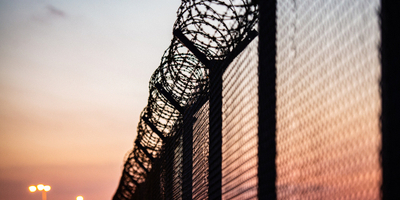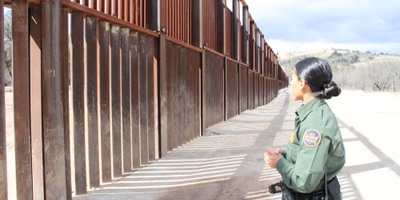Customs Border Protection Officer
When it comes to the nation’s security, there are many potential threats to keep in mind. Customs Border Protection (CBP) Officers watch different ports of entry to catch terrorists, illegal weapons, and those who try to bring illegal goods into the country. Becoming a Customs and Border Protection Officer requires you to obtain a high security clearance, demonstrate your skills via education and experience, and go through a rigorous hiring process.
CBP Officer Job Description
As a Customs and Border Protection Officer, you may have to interact with lots of people. As people enter the country, you may inspect their belongings, look for signs of illegal activity or possessions, and seize items that cannot enter the country. You may also have to ensure that those who are entering the country are legally permitted to do so. Part of your career may be learning about human traffickers, narcotics dealers, and other dangerous criminals. This allows you to intercept criminals before they enter the United States.
CBP Officers have a fairly physical job, so physical fitness is very important. You’ll have to prove your fitness level in several different ways during training, so it’s essential to begin preparing as soon as you know you want to pursue this career. These are also numerous experience and education requirements to keep in mind.
How to Become a CBP Officer
US Customs and Border Protection requires those who apply for CBP Officer jobs to meet a stringent list of requirements. The requirements vary, depending on which grade level you want to enter at. The higher the grade level, the higher your starting income is.
Your experience and background dictates which general service (or GS) level you are qualified to enter the force under. To enter at the GS-5 grade level, you need a bachelor’s degree from an accredited educational institution. You can earn a bachelor’s degree in any field. However, it’s important to note that this is a very competitive career choice. As a result, having a Bachelor’s degree in criminal justice or a related field can be beneficial. If you would rather qualify for a GS-5 position with experience, you need three years of general work experience in working with people.
To start a CBP Officer job at the GS-7 level, you need a bachelor’s degree and at least one year of graduate-level education. A master’s degree can make you even more qualified for this position. Consider earning a master’s degree in criminal justice, law, or a similar field to enhance your qualifications. If you do not have a master’s degree, you need at least one year of work experience in inspections or the screening of people as they enter the country. For both GS-5 and GS-7 positions, you can use a combination of experience and education to meet minimum requirements.
After passing two fitness tests and receiving a position with Customs and Border Protection, you need to complete the agency’s required training program. Training takes place at the Federal Law Enforcement Training Centers in Glynco, Georgia. Your training covers quite a bit of physical work, including exercise training, interactive scenarios, and passenger processing training. In the classroom part of your training, you learn about Title 19 Customs law, Title 8 Immigration law, and other laws related to your new position. This training lasts 89 days.
CBP Officer Salary and Career Outlook
Though Customs and Border Protection has a significant need for officers, the hiring process is very challenging. As a result, the job outlook is best for those who exceed the agency’s minimum requirements. In addition, you may have a better job outlook if you are willing to relocate anywhere in the country. Customers and Border Protection sends officers to a range of locations. Regions include: the Southwest, Texas East, Northwest/Northern Border, West Coast, Midwest, Northeast, Central/East Coast, Southeast, Florida, Pacific, Alaska, and Hawaii. Clearly, the demand is greatest near United States borders and coasts.
Salaries for border patrol agents are set according to the general services pay scale. GS-5 Officers start with a salary of $28,945 to $37,630. GS-7 Officers earn between $35,854 and $46,609 to start. These are base salaries. On top of your base salary, you earn locality pay, which corresponds to the cost of living in the area that you’re stationed.
Given how many borders and sea ports are protected by Customs and Border Patrol, it’s no surprise that CBP Officers do a lot to keep the United States safe. In April of 2018, border patrol agents in California seized $623,000 of hard drugs. Also in April, a man who was convicted for kidnapping was arrested by border patrol.
Your work environment will depend on whether you work at a border, seaport, or other entry point. If you work at a border, you may have to stop and search cars or watch for people trying to enter the country via other means. Those who work at seaports often check cargo and ensure that travelers are legally permitted to enter the United States. Some CBP Officers are trained dog handlers. If you work with a police dog, you may work specifically in the detection of illegal drugs and drug smuggling.
CBP Officers work closely with the Drug Enforcement Administration, the FBI, and other law enforcement agencies. As a result, you may sometimes be sent to other locations to carry out an investigation or assignment. No matter where you’re assigned, you can feel confident knowing that you are one of the people that help keep the United States safe.
2022 US Office of Personnel Management salary and employment figures contained here reflect national data, not school-specific information. Conditions in your area may vary. Data accessed November 2023.
If you are ready to learn more about starting a career in the field of criminal justice, contact the schools in our directory to compare their programs!









